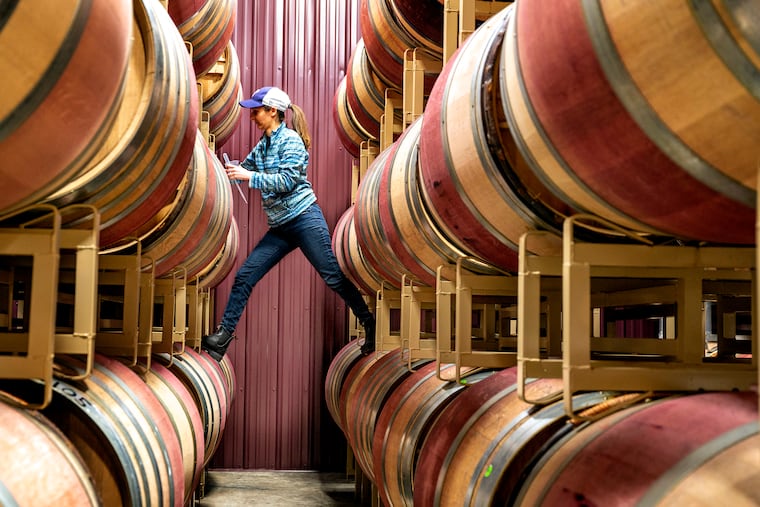Could weddings or car shows be a lifeline to preserved farms struggling in South Jersey?
N.J. officials say a new law was needed to help owners of preserved farms take advantage of a boom in "agritourism" embraced by other commercial farms.

Two years ago, Bill Green bought a historic South Jersey farm and invested millions more to create a winery on land first settled by John Stafford, a personal bodyguard to George Washington.
By the 21st century, the 140-acre Stafford farm was under development pressure until Voorhees Township bought it in 2004 for $20 million through state, county, and private grants. Half was saved as open space, half as farmland. Green bought the farm half for $900,000 and rechristened it Saddlehill.
Under a law signed Feb. 3 by Gov. Phil Murphy, farms on preserved land such as Saddlehill will be able to host large nonagricultural events such as weddings, car shows, anniversary parties, and even corporate events. Officials say the law will help owners of preserved farms take more advantage of a boom in types of “agritourism” already available to farms on unpreserved land. Without the law, owners of preserved farms were limited to hosting agricultural-themed events.
Wineries, which have exploded in popularity across the state, are expected to be major beneficiaries.
While the law might help some farms, Green, 64, said, he’s content to wait and see how it plays out. For now, his focus is Saddlehill’s first batches of reds and whites from grapes grown on the land and aging for sale next spring in a tasting room under construction.
“Quite frankly, we’re not focused on events, and we’re not even open yet to the public,” Green said.
Murphy said in a statement that “agritourism is the next frontier to maintaining” the state’s agricultural heritage and that the “law will open new revenue streams for those who work tirelessly to maintain the preserved farmland that is core to our state’s cultural fabric.”
State Sen. Paul Sarlo (D., Bergen) said the law would allow farms to “offer a beautiful venue to host weddings and other events that help farmers supplement their income and preserve their farmland.”
Indeed, the law could prove important to South Jersey. Salem County has 42,644 acres of preserved farmland, the most of any county. Burlington, at 29,288 acres, and Cumberland, at 22,286 acres, also have substantial amounts.
Overall, New Jersey taxpayers have paid $1.8 billion to save 250,000 acres of farmland from development, which means restrictions remain with the land regardless of who buys it.
Will neighbors fight it?
The law is designed to help preserved farms hold their value and compete for agritourism — generally, educational or entertainment events that draw people looking for a farm experience. Pick-your-own fruit and seasonal festivals were already allowed on preserved farmland. But special events were not because they are not tied to specific crops or agricultural products raised on the land.
Some agritourism, such as weddings and other events, have drawn opposition from residents citing traffic and noise. Though preserved farms will still have to comply with local ordinances, the new law gives them some legal cover to host big events.
Mike Halpern, who owns 5.25 acres of preserved farm in Upper Township, outside Ocean City, has been fighting residents opposed to his plan to operate a winery. He bought the former Trop’s Tree Farm on Bayaire Road with plans to call it “Ocean City Winery.” The land was already preserved when Halpern bought it in 2005 for $333,000 and began growing grapes.
Because of the opposition, he dropped designs for an 80-seat tasting room and has a hearing Monday for the remainder of his plan with the Cape May County Agricultural Development Board.
» READ MORE: ‘Ocean City Winery’ owners drop plans for an on-site tasting room
Based on his experience, Halpern said, there is “no question” some neighbors will challenge preserved farms holding special events, regardless of what the new law says. He does not plan to host events for now but said he is excited for the law and believes it will help farm owners.
In Pennsylvania, nonagricultural events are not allowed on preserved farmland, according to Lily Guthrie, a state and local affairs specialist for the Pennsylvania Farm Bureau. Though state officials have passed legislation to help farms encourage agritourism, there is no proposal similar to New Jersey’s for preserved land.
Race against developers
New Jersey has a goal of preserving 500,000 acres, in all, said Susan Payne, director of the State Agriculture Development Committee (SADC), which administers the New Jersey Farmland Preservation Program.
“We’re approximately halfway to our goal,” Payne said. “Given the development pressure on farmland, however, we’re going to have to accelerate the pace.”
So the new law could apply to more farms in coming decades.
Peter Furey, executive director of the New Jersey Farm Bureau, said the law could help some of the more than 2,000 preserved farms in the state that are facing red ink.
“This is supplemental income to the farm operator who struggles for profitability,” Furey said. “When you add agritourism revenue, it helps keeps the business going.”
Douglas Fisher, secretary of the state’s Department of Agriculture, said farmers “are subject to huge fluctuations in pricing for their products,” and agritourism helps smooth over the bumps.
The law is so new that the SADC hosted a workshop Feb. 14 to brief South Jersey municipal officials on what’s allowed and the possible impact on local ordinances. Farms planning events still must comply with state and local laws on zoning, food safety, litter, noise, solid waste, traffic, and public safety.
Devon Perry, executive director of the Garden State Wine Growers Association, said she believes the law will give a lift to what she says is “the fastest growing sector of agriculture in the state.”
“We are supportive of anything that continues to nurture the future of agritourism in the Garden State,” Perry said.